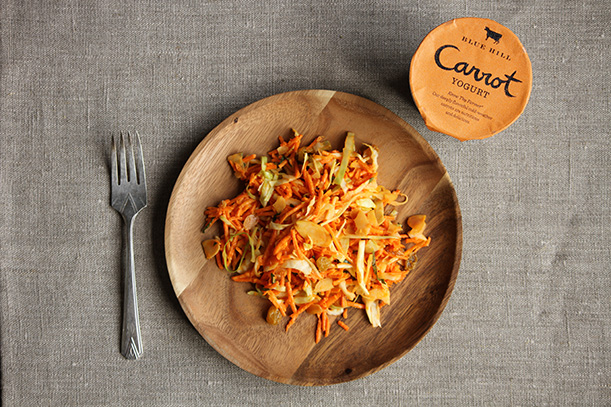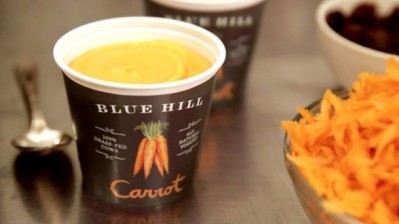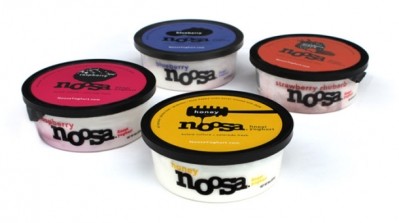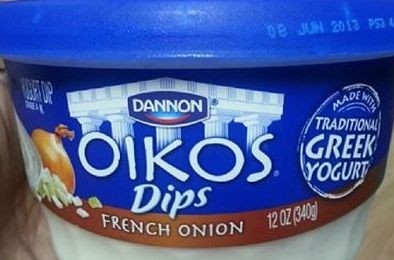Savory yogurt gamble pays off for Blue Hill: ‘We didn’t want to bring out another Greek or fruit yogurt; we wanted to be different’
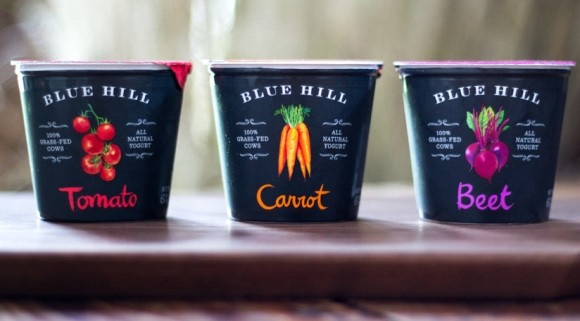
The yogurts - manufactured by a co-packer in New York with milk from 100% grass-fed cows from farms in the Northeast including Blue Hill’s own farm in the Berkshire Hills - come in butternut squash, beet, carrot, tomato, sweet potato, and parsnip variants.
They are now available in three Whole Foods Market regions and specialty grocers in the Northeast.
Ours have a fraction of the sugar, but are only slightly less sweet than regular yogurt
Made with 30% or more vegetable puree (whereas most fruit yogurts only contain around 6% fruit puree), the yogurts are blended (no big chunks of carrots or beets) and far less sugary than most yogurts on the market, Barber told FoodNavigator-USA.
And just three months after hitting shelves, they are already proving to be a hit, he said.
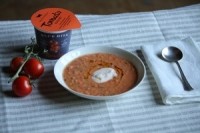
“We didn’t want to bring out another Greek or fruit yogurt; we wanted to be different.
“We’ve been honing the recipes for a few years because we’ve been serving the yogurts at Blue Hill’s restaurants in New York for a while. We were getting so much positive feedback that we decided to see if there was a wider market for something a bit less sweet.
“And it looks like there is because we are getting great repeat purchases and we’ve now expanded from an initial 12 Whole Foods stores to three Whole Foods regions: North East, North Atlantic and Mid Atlantic. They have been incredibly supportive - a great partner to work with. But we’re also talking to lots of other retailers.”
Consumers are also making shakes, using it for cooking, dressings or dips, adding it to baked potatoes
As the Action on Sugar campaign has been pointing out this month, a lot of yogurts - while low in fat - are still very sugary, said Barber.
“Ours have a fraction of the sugar, but are only slightly less sweet than regular yogurt because you’ve got the natural sweetness from the vegetables. They are slightly higher in salt, but the trade-off is worth it. The veggies also act as a great preservative.”
But what do consumers make of savory yogurt?
“From what people are telling us, they are eating Blue Hill Yogurt just as they would any yogurt—on its own, as a dessert or a snack, especially when they are craving something a bit less sweet,” said Barber.
“But they are also making shakes, using it for cooking, dressings or dips, adding it to baked potatoes and so on. We’ve got a lot of recipes on our website (click here). There was a real spike in sweet potato and butternut squash to start with that we think might be because of the holiday season. People also love the carrot and beet. We’ve got tons of ideas for new recipes as well.”
The recommended retail price - at $2.99 for a 6oz pot - is at the higher end of the category, but not at the super premium end, he said.
“In the premium yogurt market, you go from around $2.19/pot to $3.69, so we’re at the more luxury end. But we have a high end restaurant brand and dining experience with the Blue Hill brand and we want to translate that into the retail market.
“We’re really proud of the product and we don’t want to make all kinds of compromises so we can get it down to a dollar.”
We know a lot of yogurt companies are paying a lot of attention

So are other savory yogurts likely to follow Blue Hill’s lead?
It’s likely, predicted Barber. “We know a lot of yogurt companies are paying a lot of attention to our products and I’d anticipate people will dip their toes in the water if they haven’t already.
“But there is plenty of room in the market. There is just so much potential because US consumers still only eat around a third of the yogurt that Europeans do, and we’d like to see the category grow with less sweet products.”
Datamonitor: There is no rule that says that all yogurt must be sweet or contain fruit
Ina recent blog post, Datamonitor innovation insights director Tom Vierhile said the Blue Hill concept was “refreshingly new”.
He added: “There is no rule that says that all yogurt must be sweet or contain fruit. It just seems that way.
“Consumers know that vegetables are good for them – even better than fruit in some cases as they are naturally lower in sugar – but it can be difficult to add vegetables to their diet because they often require cleaning or preparation before they can be enjoyed.
“Blue Hill vegetable yogurt is an easy way to boost vegetable consumption, and also picks up where Greek yogurt leaves off by extending the use of yogurt in recipes and more.”
David Barber co-owns Blue Hill with his brother Dan Barber (executive chef), and his wife Laureen (design director).


